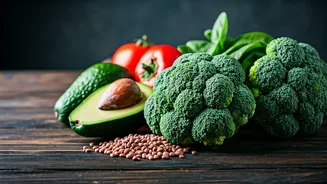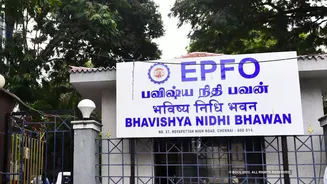Fat-Soluble Vitamin D
Vitamin D is unique because it's a fat-soluble vitamin, which means it requires fat for proper absorption in the body. The primary way the body creates
vitamin D is through exposure to sunlight. Dietary sources, such as fatty fish, egg yolks, and fortified foods, provide vitamin D. However, the fat-soluble nature of vitamin D means that if the diet is too low in fat, the absorption rate declines significantly. For optimal absorption, vitamin D needs to be consumed with a source of healthy fats. Therefore, balancing food intake is essential.
Oxalate-Rich Foods
Foods high in oxalates can interfere with the absorption of several nutrients, including vitamin D. Oxalates are naturally occurring compounds found in many plant-based foods, such as spinach, rhubarb, and certain types of beans. These compounds bind to calcium in the gut, which can indirectly impact vitamin D absorption, as the body uses vitamin D to regulate calcium levels. While these foods offer other nutritional benefits, consuming them in excessive amounts, particularly without adequate calcium intake, may affect vitamin D utilization. It's often recommended to balance intake of oxalate-rich foods with calcium-rich foods to minimize potential negative effects.
Phytate's Role in Absorption
Phytates, also known as phytic acid, are another type of compound found in plant-based foods, especially grains, legumes, and nuts. These compounds can bind to minerals like calcium, zinc, iron, and magnesium, potentially inhibiting their absorption. Since vitamin D helps the body absorb calcium, the presence of phytates can indirectly impact vitamin D's efficacy. While phytates can pose an issue, the effects often depend on the preparation method. Soaking, sprouting, or fermenting foods high in phytates can reduce their concentration and improve nutrient availability. Therefore, choosing properly prepared foods and eating a balanced diet is important.
Fiber's Impact on D
High-fiber diets are generally beneficial for overall health, but excessive fiber intake can potentially interfere with vitamin D absorption if other dietary factors aren't considered. Fiber, particularly soluble fiber, can speed up the digestive process, potentially reducing the time nutrients spend in the gut where absorption occurs. While fiber itself doesn't directly block vitamin D absorption, it can affect the overall efficiency of the digestive system. To mitigate any negative effects, it's essential to ensure you're consuming enough fat along with fiber-rich foods, and to space out the consumption of vitamin D-rich foods and fiber-rich meals to allow for better absorption.
Balancing Your Diet
Addressing potential interferences with vitamin D absorption involves making informed dietary choices. It's important to consume vitamin D-rich foods alongside healthy fats to aid absorption. Being mindful of the quantities of oxalate-rich foods, and balancing them with calcium-rich sources, is beneficial. Considering the preparation of foods high in phytates through methods like soaking or fermenting can reduce their impact. Likewise, managing fiber intake and spacing it out from vitamin D consumption can optimize absorption. Ultimately, a balanced and varied diet, considering the impact of different food types on nutrient absorption, will best support healthy vitamin D levels.














